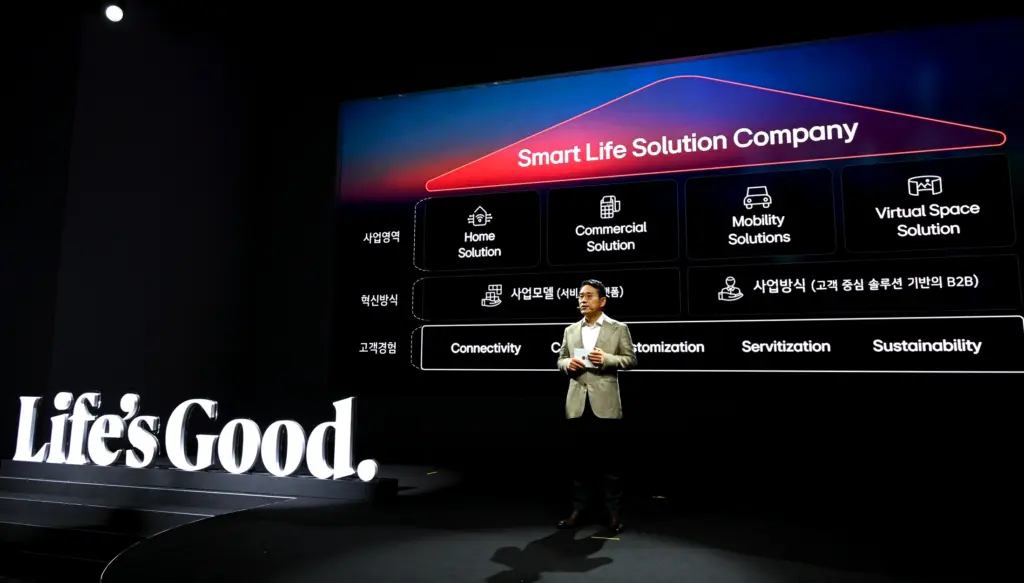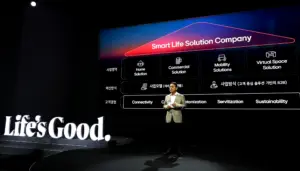LG is embarking on a strategic transformation aimed at revolutionizing its business model and maximizing customer engagement. The company plans to shift from a hardware-oriented approach to a platform-based service business model that generates continuous profits. It is a move from manufacturing to a company that delivers content, services, subscriptions, and solutions to customers worldwide based on the products it manufactures.
The transformation begins with LG’s TV business, which is set to undergo a significant overhaul based on its webOS operating system. With over 200 million smart TVs powered by webOS globally, LG aims to transform its TV business into a leading “media and entertainment service provider.” This will involve expanding content offerings, services, and advertisements across LG’s competitive lineup of OLED and QNED TVs.
To bolster its content competitiveness, LG is committing over 1 trillion won ($784 million) in investments over the next five years. A key focus will be the growth of LG Channels, an advertising-based free broadcast platform. With an impressive user base of 48 million users across 29 countries, LG plans to expand the availability of the webOS platform to external TV brands and extend the application of webOS to other product groups.
LG Transforming All Divisions
LG’s household appliances division is also undergoing a transformation towards a service-based portfolio. The goal is to enhance LG ThinQ UP appliances, enabling post-purchase upgrades and evolving into a comprehensive “Home as a Service” platform. This platform will integrate hyper-personalization, subscriptions, and smart home services to meet evolving customer needs. Furthermore, LG’s home appliance rental and care service business will expand to cover all aspects of product maintenance, management, and cleaning, with a remarkable compound annual growth rate of over 30% in the past five years.
The company is accelerating its expansion into the business-to-business (B2B) market, particularly in the electric vehicle (EV) sector. LG aims to become a leading electric component part provider worth more than KRW 20 trillion by doubling its sales by 2030. Anticipating the trends of vehicle electrification and connected services, LG is actively exploring opportunities in autonomous driving, software solutions, and content. The order backlog for LG’s Vehicle component Solutions Company is projected to reach KRW 100 trillion by the end of the year, highlighting its competitive edge.
Additionally, LG has set ambitious goals for its heating, ventilation, and air conditioning (HVAC) business. By 2030, the company aims to double its HVAC sales and establish itself as a global top-tier comprehensive air conditioning company. To achieve this, LG plans to pursue organic strategies such as mergers, acquisitions, and equity investments. The company is also preparing for the future by venturing into energy service sectors like energy storage systems, home energy management systems, and virtual power plants.
In the built-in home appliances market, LG aims to expand its presence in North America and Europe, which collectively account for over 70% of the global market share. The company is determined to become one of the top five built-in appliance brands worldwide. In the commercial displays sector, LG focuses on delivering customized solutions for specific customer groups, thereby ensuring sustained growth.
Over the past two years, LG has strategically exited its mobile phone and solar panel businesses to redirect its resources towards high-growth areas. The company plans to further accelerate its development by selectively investing in new businesses with similar growth potential.
LG is also making significant investments in digital healthcare, spearheaded by its North American Innovation Center, LG NOVA, based in Silicon Valley, California. The company is expanding its investment scale in LG NOVA and actively collaborating with telemedicine company Amwell to provide remote medical treatment solutions. In the future, LG intends to explore additional services in preventive and follow-up healthcare management through strategic investments.
Furthermore, LG is venturing into the EV charging business, aiming to provide comprehensive solutions that encompass control areas in addition to charger sales. The company recently launched four products in South Korea through its affiliate company HiEV Charger and plans to expand into the European and Asian markets next year. LG will also establish new production bases to target the North American market.
Embracing the potential of the metaverse, LG is engaging in strategic collaborations and developing Mixed Reality and Augmented Reality devices. Collaborative efforts with leading global platform companies are driving the development of these devices, while the Korean Ministry of Science and ICT’s AR Glass Advancement project focuses on advancing augmented reality technology and content production ecosystems. The company is committed to providing immersive experiences on large screens, particularly on TVs.
To innovate the customer experience, LG recognizes the importance of digital transformation. By integrating customer data and understanding hidden needs, the company aims to build a business model that enhances communication and delivers unprecedented customer experiences. LG is strengthening direct-to-consumer sales through its online brand shop, LGE.com, and increasing the operation of pop-up stores to engage with younger generations. The company utilizes internal systems such as Lifegraphy and IC 360 to analyze customer data and discover latent needs, while the CX Center leads customer behavior research to integrate customer-centric experiences into products and services.
LG CEO Outlines Performance Goals
CEO William Cho outlined this vision, aiming to connect and expand customers’ diverse experiences while targeting annual revenues of KRW 100 trillion ($77.5 billion) by 2030, targeting an average growth rate and operating profit of 7% or more, along with an enterprise value to EBITDA ratio of 7, known as Triple 7.. Cho identified three growth engines to drive this transformation: advancing the business portfolio through new platform-based service businesses, accelerating the business-to-business (B2B) sector, and exploring new business areas such as electric vehicle charging and digital health. The company aims to establish itself as a smart life solutions provider, surpassing its current position as a top home appliance brand. CEO Cho emphasized the need to reinvent the way LG works and communicates to achieve this ambitious goal.

Internally, LG has launched the Reinvent LG campaign, fostering an organizational culture of innovation and change. By empowering employees to lead the transformation, the company aims to reinvent its brand and adopt a dynamic and youthful look at customer contact points worldwide. LG’s commitment to environmental, social, and governance (ESG) initiatives is reflected in six core commitments, including carbon neutrality, circular economies, eco-conscious products, sustainable supply chains, an inclusive organizational culture, and accessible products and services.

